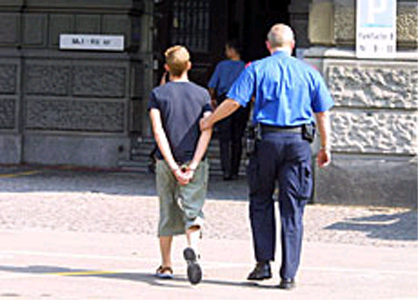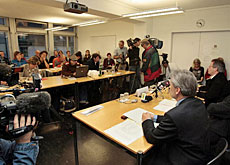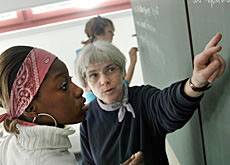Expert warns foreign parents must be integrated

The alleged rape of a 13-year-old girl by a group of youths in Zurich has awoken the Swiss to the fact that they must pay more than lip service to integration.
Thomas Kessler, responsible for integration matters in canton Basel City, tells swissinfo that the authorities must act quickly to repair the damage from years of inaction.
A number of young immigrants as well as Swiss youths have been accused of a series of brutal acts in recent weeks. These actions have raised questions about why some communities feel that Swiss laws and customs do not apply to them.
Basel has been playing a pioneering role in integration matters, and its experience has shown where integrating a foreigner has been a success or a failure.
Kessler advocates what he calls “proactive communication” to promote integration.
swissinfo: Can a case like the gang rape in Zurich push people to reject young foreigners?
Thomas Kessler: Equating foreigner with criminal is a dangerous idea. There are plenty of socially disadvantaged people who stay within the confines of the law. We have to recognise problems when they crop up and deal with them specifically. We know the answers.
swissinfo: How should we do that?
T.K.: Integrating parents is the most important thing. We have to make them take responsibility for educating their children! Basel is going to make foreigners sign a contract next spring that is linked to their residence permit. They will have to attend German classes if they don’t know the language, social integration courses if they are socially isolated, vocational training if they don’t have a job and so forth.
A course on Swiss institutions will also be proposed. The classes won’t be free and the people attending will have to pay at least some of the cost.
swissinfo: But how can you force parents to educate their children?
T.K.: We have to communicate in a pro-active fashion. For example, I am going to the town of Muttenz on Sunday, where the Albanian community is celebrating its national day. I will talk about the Zurich rape case. We have to communicate at all levels, starting at school. Teachers say that some parents never come to parent-teacher evenings.
With cultural mediators, cultural and sports clubs, we can get a message through that there are some rules that have to be respected and that breaking the law will be punished. We have to make up the ground lost over the past ten to 20 years.
swissinfo: What happened during that time?
T.K.: We hung on to this illusion that the state should not intervene in private matters. We didn’t look after the parents, we didn’t make them integrate. We thought schools could handle education alone. It was a mistake. When you don’t act, first-generation immigrants pass on all their problems to their children.
swissinfo: Are immigrant parents the only ones who can make a difference?
T.K.: Globally, society lacks courage in daily life. We shouldn’t tolerate vandalism or disrespectful behaviour. We should also take our responsibility and act against the slightest breach of behaviour.
swissinfo: Even with small children?
T.K.: Between the ages of seven and nine, it’s easy to correct the situation. Between ten and 11, it’s the last opportunity. After that, peer pressure is so strong that it is hard for a teenager to escape it.
swissinfo: In the case of sexual violence, the image young boys have of women seems to also be a problem?
T.K.: There are four factors playing a role here. These youngsters come from countries that were at war, where rape was a weapon. They also come from patriarchal societies, where the father has the authority and the social control. When they arrived here, it was the complete opposite: an ultra-liberal society with no safeguards.
A third element is that those who fall behind at school try to compensate by being violent. Finally, we live in a society where sexuality is over-represented. Consumption of pornography is higher among those to whom it does the most damage. How immune you are to these images varies from person to person. If those four elements coincide, something is going to happen.
swissinfo: Is the fact that in some societies boys have more freedom than girls also a risk factor?
T.K.: I was also brought up like that. It’s another issue entirely. Problems arise when total freedom is coupled with a complete lack of respect. Fathers must teach their sons to respect their teachers as well as others.
swissinfo-interview: Ariane Gigon Bormann
A 13-year-old teenager was allegedly raped by a number of youths at the beginning of November in Zurich.
Ten minors and two adults are under investigation, and only two have been released from police custody since their arrest.
All of the youths are either foreigners or recently naturalised Swiss.
Investigators said on Friday they were still trying to piece together what happened exactly. More witnesses could be heard.
The director of the school attended by the victim and four of her alleged aggressors has gone on sick leave because of stress. Many parents have asked for their children to change school, according to local media.
Basel’s integration office was opened in 1998 and has promoted the integration of immigrants through a variety of actions.
These include cultural mediators, “coaches” for apprentices, sporting tournaments under the fair-play banner, language courses and information for new immigrants.
The office also registers discrimination complaints filed by immigrants.

In compliance with the JTI standards
More: SWI swissinfo.ch certified by the Journalism Trust Initiative


You can find an overview of ongoing debates with our journalists here . Please join us!
If you want to start a conversation about a topic raised in this article or want to report factual errors, email us at english@swissinfo.ch.